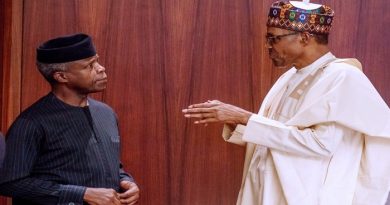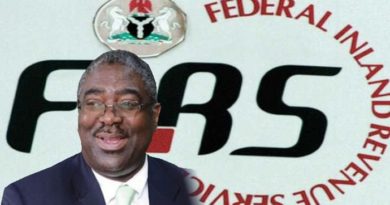We’ll name, shame tax defaulters after VAIDS in March, 2018 — Adeosun
Finance Minister, Kemi Adeosun, still pushing through the Voluntary Asset and Income Declaration Scheme (VAIDS), scheme aimed at getting more Nigerians into the tax net voluntarily, in this interview throws more lights on the issues involved.
VAID is a few months to lapse. Don’t you think that the time left for people to respond to this scheme is quite short, taking into consideration Nigerians in the Diaspora?
It is a 9 months program that we started on the 1st of July. We have four months left. So, there is enough time for anyone who wants to comply to pick up the asset declaration form. I filled my form two weeks ago, and it took less than 20minutes to complete. The typically tendency of our people is, to defer things.
I am not sure that extending the time makes any difference because Nigerians will still leave it to last minute. There is plenty of time from now till March for those who want to get involved in the scheme.
It’s been 5 months into the program. How has the response been?
We have had very good responses from companies. So far, we have received $110 million from just 2 companies. One of them paid a liability of $55 million, while the other paid $44 million. Let me give this illustration. If you live in Lagos, Lagos government does not know you run a business in Abuja.
Level of non-compliance
Lagos does not know that you have a property abroad, or that you moved some money to Dubai. Meanwhile Lagos state does not have the jurisdiction to go to the Emirates and say ‘this is my resident. What affiliation does he/she have with your country?’ Largely, no one was really paying the right tax because of these many loopholes.
When we did the analysis, only 241 people in the country were paying above N20 million. South Africa has 950,000 people paying that equivalent amount. Whereas, some of the richest Africans are Nigerians living very good lifestyles, but because the tax system is so lose, people decided not to pay. The level of non-compliance informed the design of the programme. In jurisprudence, they say if nine out of ten people comply with the rule, there is nothing wrong with the rule. But, when nine of the ten people are not complying, then there is a problem with the rule. That’s why we designed the amnesty program, to let people come in and do the right thing. So take that illustration I gave earlier of someone who resides in Lagos and runs a business in Abuja. Maybe the only thing he declares is a salary of N500,000 monthly, meanwhile, he has a private jet, an expensive yacht; his children are in school abroad, but government doesn’t know. Now, we have pooled all the data together and profiled people. Once the lifestyle of the person does not match the tax paid, then the person has under paid their taxes. So far, the response has been very good because people now know we have the data and we proven that we are ready to use it. So we have given people until March 2018 before we call them tax evaders. After March, we can officially call them tax evaders; hence we can then name and shame them. Candidly, the response has been very good especially from high net-worth people.
One of the main reason Nigerians do not pay tax is because of lack of social contract. Why should Nigerians be propelled to pay tax when the basic amenities are not even available?
It is a good argument but it is a flawed one. Today, of the 14 million taxpayers, 90% of them are salary earners and they pay their taxes via P.A.Y.E (Pay As You Earn). Salary earners are taxed whether they enjoyed amenities or not. So, why is it right for billionaires to make the decision whether to pay tax or not. Should billionaires pay taxes only when government does what they like, while salary earners are forced to pay regardless? Interestingly, these billionaires pay taxes on their property and rents abroad, and they don’t complain. We have to change that mind-set. Tax will help deepen the social contract between the government and citizens. When people pay taxes, they will take interest in how their leaders are elected. As long as it is oil money, nobody knows how much it was and what to expect. Then the social contract is broken; it is then very difficult to hold government accountable. So, we need to break the cycle of, ‘I will not pay tax until government constructs the roads’. The truth is that those arguments do not benefit the middle class. It benefits the high class people who choose when and when not to pay tax. Most of the billionaires here made their money in Nigeria, so why should they evade? They make billions in Nigeria and take it to an offshore haven where they still pay tax.
How determined is the government to prosecute tax defaulters after March 31, 2018? What then will be the advantage to those who complied with the scheme if we don’t prosecute?
We must name and shame the defaulters after the deadline. We will definitely prosecute them. In addition, the worst court is that of public opinion. So we have about 500 letters ready, when I spoke to two people that I know of the 500 people, they were begging me to give them the letter personally. The truth is that people don’t want to be embarrassed. Tax evasion is a criminal offence and we will prosecute evaders after March 31, 2018.
Do you reckon you may have to deal with a significant number of people not complying?
It will be very disappointing if a large number of people that should comply do not. That will mean that this work of getting the message out has failed. We are using every means, namely; social media, videos, adverts, website. We have done a lot to get the message out. When we were designing this program, the team went to Indonesia, Turkey, India and other countries that have done big tax amnesties; we found out that once people know you have the data, they will comply. Lagos, Ogun state and FCT have given us their Land registry. We have also gotten data from CAC, FIRS, SEC, CBN, Remita, NIBBS, FRSC, NCAA, among others. There is really no hiding place, frankly. We are in no hurry. Nigerians have until March to declare, while the government has from March going forward to prosecute.
How about people in the rural areas? How do you plan on getting them into the scheme?
Using the 80/20 principle, the people in the villages are not my problem, honestly. When I was Ogun State Finance Commissioner, even after I chased and chased people in the villages to pay tax, at the end of the day, each person about N2000 at most. I am not after chasing people like them. As mentioned earlier, 2 companies declared their assets and income, and paid a liability of $55 million and $45 million. So, we are concerned with big people that made their money from Nigeria. Government contractors. Let me give you an example. We asked the Office of the Accountant General to send us the data of every payment over N100 million in the last 5 years. We then checked FIRS for the data on taxes they paid. These government contractors had declared less than the amount the government actually paid them. This does not even include their other income streams which would have included the transactions they had done with the bank and personally. This was business with the government, yet they weren’t declaring their income aptly. Nigeria’s tax to GDP ratio is just 6 percent, while Ghana and South Africa are at 15 per cent and 24 per cent, respectively. The numbers do not lie; people are not paying taxes. Let’s get to the deadline first, before we start asking for deadline extensions. Interestingly, on the list of the 500 addressees, the people that are most worried are the politicians. They are the ones pushing to comply before the deadline. We have built in payment in instalments. We understand that a lot of people may not have the money at their disposal now. As long as people are ready to do the right thing, we will give them time to pay up.
What is the aggregate amount that has been realized from the VAIDS?
The scheme has not ended, so it is difficult to answer that question. The declaration forms are filled on a daily basis and we review the declarations against our database. By human nature, people may not declare honestly, so we write back to them telling them that what they had declared is inaccurate. The experience from the study tells that people will want to wait till last minute to declare. We are expecting a big rush towards the end. There is something in the psyche of Nigerians that leaves everything to last minute. It is fine nonetheless, because we will be fully ready when the rush comes. A lot of the processes are automated, hence, there won’t be challenges when the rush comes.




